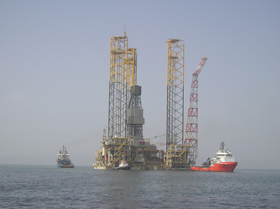Even with stiff economic sanctions in force, a joint U.S. – Israeli military operation against Iran seems the most likely scenario for the evolving conflict over the Iranian nuclear program. A “hot phase” would pose numerous risks and challenges to Iran’s neighbors, including Russia. The confrontation would face the adjacent countries with a difficult choice: whom to support and how to preserve sovereignty.
War Seems Near
The situation surrounding the Islamic Republic of Iran (IRI) is becoming increasingly tense from day to day. Another package of strict economic sanctions against the republic has come into force: on July 1, 2012 Iranian oil deliveries to Europe were embargoed, with sanctions against the Central Bank of Iran already in full swing. This economic pressure on Iran is being bolstered by media leaks from the U.S. and Israeli defense departments about preparations for a military strike. The latest reports said the Pentagon was purchasing German underwater drones to de-mine the Strait of Hormuz [1].
The construction of missile defenses is underway in the Persian Gulf: to protect major cities and oil production and refining facilities from Iranian rockets. This program has seen Kuwait provided with antimissile assets including 60 Patriot PAC-3 systems worth $ 4.2 billion. After 2008, the United Arab Emirates bought two American THAAD antimissile complexes for $ 12 billion. Saudi Arabia also possesses an impressive Patriot arsenal. The region also has numerous missile defense elements deployed at U.S. ships and inland bases [2].
The countries of the Persian Gulf are rushing to find alternative routes for the import and export of food, and fresh water supplies, most of which go through the Strait [2]. We are seeing the United States, Israel and their allies take systematic preparations for a military strike against Iran.
Despite this immense pressure, Tehran will not give up its nuclear program and continues to defend its right to develop it for civilian ends. Russian and Chinese steps to boost negotiations as part of the group of six seem to have failed. Iran did not display any clear-cut readiness for a compromise in the latest round. At the same time, the feeling prevails that, should Tehran yield, Washington would declare the concessions insufficient to remove sanctions and take the military option off the table, which is more likely after the November 6 presidential vote.
Collateral Risks for Caspian and Central Asian Countries
With the threat of a military conflict over Iran growing, there is a heightened need for risk forecasting in Russia and Caspian states, which definitely have an interest in seeing a peaceful solution and the lifting of all economic sanctions. For these countries, an acute long-term crisis is, to say the least, absolutely unwelcome. The Libyan scenario, the disintegration of a large and multinational country like Iran, would generate long-running instability; foster the spread of terrorism, extremism, weapons and drugs.
An attack against Iran would also trigger massive refugee flows northwards: primarily into Azerbaijan, Turkmenistan, Tajikistan and the North Caucasus.
In response to a potential U.S. strike, Iran is likely to hit oil, gas and pipeline infrastructure both in the Persian Gulf and across the entire Caspian region, where hydrocarbons are chiefly developed by Western companies. This would threaten unleashing an ecological disaster on the world's largest inland water reservoir. If Azerbaijan and Turkmenistan were to support the military operation, by offering their transport infrastructure (staging bases) or radar data, they might also be targeted by Iran in retaliation.
The economic consequences of an attack would also be significant. Due to sanctions, Iran's cooperation with countries across the region is far from buoyant. Under U.S. pressure, neighboring countries have to drop lucrative contracts, and recently Assistant Secretary of State Robert Blake again demanded that Central Asian states discontinue trading with Iran. Kazakhstan and Turkmenistan have already switched their oil swap deliveries away from Iran to Russian and Azeri ports. And there have recently been problems with Kazakh grain exports to Iran.
Tajikistan has traditionally been Iran's major economic partner. In recent years Iran invested in several large projects in Tajikistan, including the $ 220 million Sangtuda-2 power station and the Anzob Tunnel between Dushanbe and the city of Hujand. Several more projects are on the way to completion. A military operation would clearly also hurt Turkmenistan, which supplies Iran with about 10 million cu. m of natural gas a year.
Russia is known as a significant political and economic ally of Iran. According to the Russian Customs Service, in 2011, trade between the two countries reached 3.75 billion dollars, with Russian exports amounting to 3.4 billion dollars.
Tehran’s Search for Safety in the North: Not Really Successful
Iranian diplomacy in the Caspian has been actively seeking to secure its northern borders and avoid total isolation under the U.S.-led sanctions. With Russia's assistance, the Second Presidential Summit of Caspian States (Tehran 2007) adopted a declaration proclaiming the Caspian a Sea of Peace. The Caspian states committed themselves to block access to their territories to third countries intent on attacking the agreement participants, and to resolve all maritime disputes through negotiations. On November 18, 2010 the Third Caspian Summit was held in Baku, where the presidents of Russia, Azerbaijan, Iran, Kazakhstan and Turkmenistan signed the Agreement on Security Cooperation in the Caspian Sea and an expanded joint final statement. This accord specifies the areas for cooperation (fighting terrorism, poaching, organized crime, smuggling, etc.), and also lists the ministries and agencies in each country responsible for implementing commitments made under the Agreement.
For a long time, the Caspian states seemed ready to uphold their obligations under this five-party agreement. But the evolving situation, and the unpredictability of the policies pursued by Iran face these neighboring states with a difficult dilemma. For political reasons these countries are not inclined to publicly debate the risks and challenges associated with possible support for an attack on Iran. Hence, forecasting the readiness of any state, for example Turkmenistan, to offer its infrastructure in support for a strike on Iran is further complicated.
At the same time, Azerbaijan is getting involved in the anti-Iranian coalition. The DoS report published in early August 2012 reveals that Baku has committed itself to deploying seven radars along the Caspian coast. Earlier, Azerbaijan was reportedly planning to spend $ 1.6 billion on Israeli precision weapons: the Israeli defense corporation Taasia Avirit is willing to provide Azerbaijan with UAVs and precision anti-aircraft and anti-missile systems.
Azerbaijan's u-turn may hinge on several factors. First, as has been mentioned, Baku fears that, in response to a U.S.-led strike, Iran might significantly damage Azeri oil and gas infrastructure predominantly used to supply Western markets. With massive U.S. involvement the country has implemented mammoth hydrocarbon projects: the Baku-Tbilisi-Ceyhan oil pipeline and Baku-Tbilisi-Erzurum gas pipeline, as well as the Azeri-Chirag-Guneshli and Shah-Deniz production fields.
Second, there is an underlying ethnic issue. Iran and Azerbaijan are hostage to their geopolitical, historical and ethnic environment, as the Azeri form a sizable minority in Iran and the core ethnos of Azerbaijan. With pressure on Iran growing, the West is likely to apply any tool, including this split ethnos factor. Iran, for its part, seems to display excessive aggression, playing into the hands of the Azeri faction that would like to see their country join an anti-Iranian coalition.
Moscow also seems prepared to review its approach, since Tehran's behavior is not entirely that of an ally, despite Russia's arguably gargantuan attempts to prevent a strike. As a matter of fact, Iran is suing Russia for $ 4 billion in an international arbitration tribunal over the aborted sale of S-300 systems, even though the contract amount was only $ 800 million. In response, the Russian side has, unofficially, hinted that it might modify its position toward the Iranian nuclear program, and even give up its explicit international support of Tehran [3].
However vocally the more moderate members of the international community, neighboring states and the general public protest, a military strike on Iran is becoming increasingly likely with every passing day. The United States and its allies have already set in motion their global mechanism to eliminate independent centers of influence. Syria is just an intermediate step: Russia, Central Asia and the South Caucasus should be ready for the worst-case (i.e. military) scenario. This would seriously affect regional relationships, since American and Israeli diplomacy is sure to press the Caspian states for assistance. For now, it seems there is neither a reliable springboard for attack nor any official staging bases in place, meaning that these countries would face the tough choice of taking sides. A single Caspian state’s official entry into the anti-Iranian coalition would mean the abrogation of those regional security agreements brought about by years of negotiations which specifically relate to the emergence of third-country military facilities in the region. This would be the worst-case scenario for Russia, which has consistently sought to achieve regional security through the coastal states themselves.
If a conflict breaks out, talks on the status of the Caspian Sea and interstate infrastructure projects would be delayed for years, and the prospect of broader regional cooperation would recede, damaging the mechanisms that have worked to maintain the good-neighborly environment in the area to date, despite the considerable existing differences.
1. Nezavisimaya Gazeta, August 7, 2012.
2. Nezavisimaya Gazeta, August 10, 2012.
3. Kommersant, August 10, 2012.







